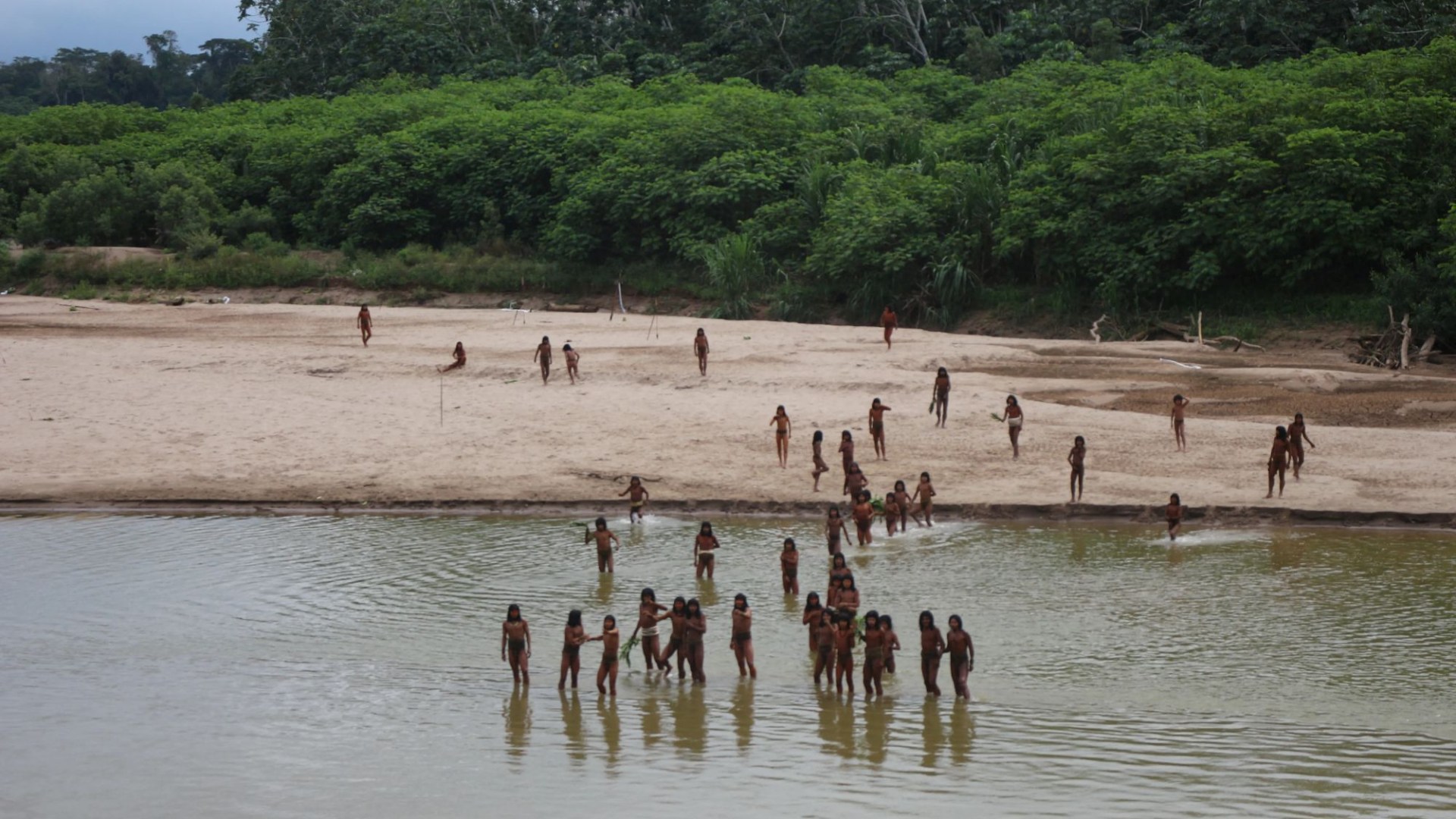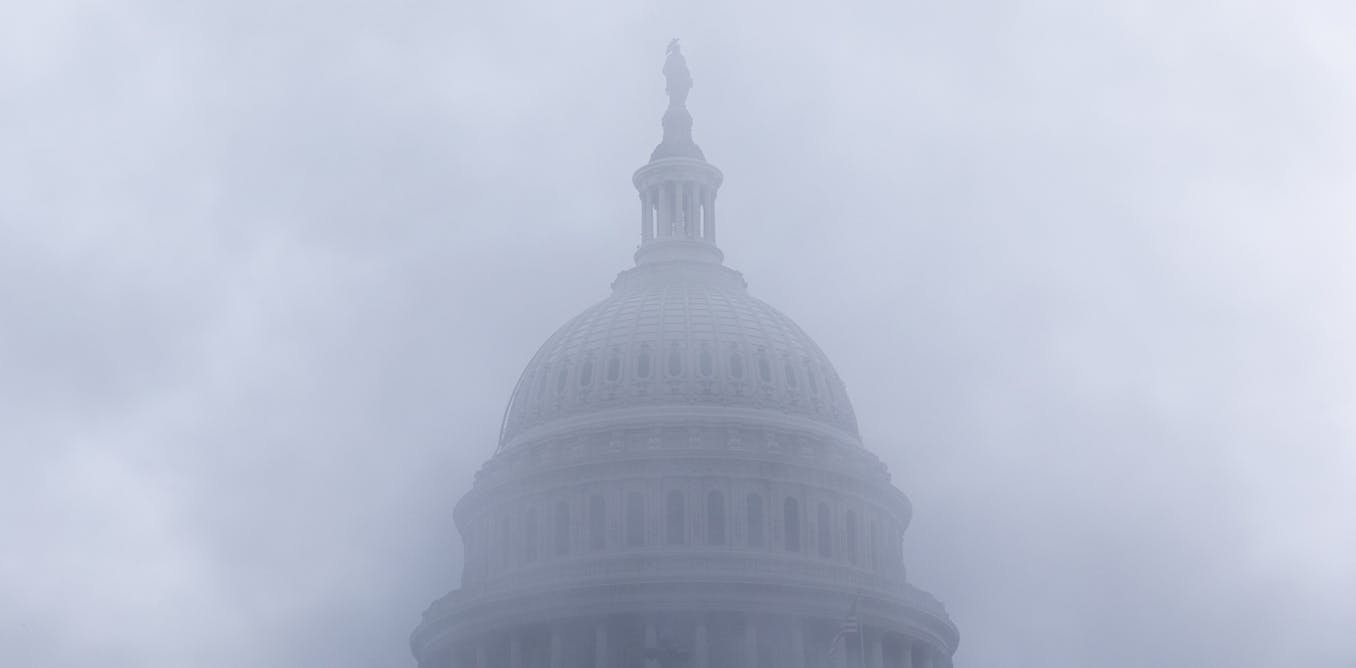A RARE new video has shown an indigenous tribe who lives hidden in the Amazon rainforest brandishing spears on the banks of a river.
Incredible footage shows the Mashco Piro people, thought to be the world’s biggest “uncontacted” tribe, standing by Peru‘s Madre de Dios river with loincloths, long hair, and bare feet.
6

6

6

6
The clip, shot from across the river shows the group standing around in small clusters, with some jogging to pick up big spears lying in the dirt.
Others are seen talking, using hand gestures, and assisting in transporting goods along the river.
The reclusive tribe has been sighted coming out of the rainforest more frequently in recent weeks in search of food, apparently moving away from the growing presence of loggers, said local Indigenous rights group Fenamad.
Experts fear that as loggers cut down the rainforest, the reclusive tribe in the Madre de Dios region of southeast Peru will be forced to leave its home.
Survival International, which works with tribes throughout the world to ensure their safety, reports that scores of tribal people have appeared to other tribal settlements in southeast Peru in recent days, anxious about the presence of loggers.
The Mashco Piro were photographed at the end of June on the banks of a river in the Madre de Dios region in southeast Peru near the border with Brazil, Survival International said as it released the photos.
“These incredible images show that a large number of isolated Mashco Piro live alone a few kilometres from where the loggers are about to start their operations,” said Survival International director Caroline Pearce.
More than 50 Mashco Piro people appeared in recent days near a village of the Yine people called Monte Salvado.
Another group of 17 appeared by the nearby village of Puerto Nuevo, said the NGO, which defends Indigenous rights.

6
The Mashco Piro, who inhabit an area located between two natural reserves in Madre de Dios, have seldom appeared as a rule and do not communicate much with the Yine or anyone, according to Survival International.
Several logging companies hold timber concessions inside the territory inhabited by the Mashco Piro.
One company, Canales Tahuamanu, has built more than 120 miles of roads for its logging trucks to extract timber, according to Survival International.
A Canales Tahuamanu representative in Lima did not respond to a request for comment.
The company is certified by the Forest Stewardship Council, according to which it has 130,000 acres of forests in Madre de Dios to extract cedar and mahogany.
The Peruvian government reported on June 28 that local residents had reported seeing Mashco Piro on the Las Piedras river, 93 miles from the city of Puerto Maldonado, the capital of Madre de Dios.
The Mashco Piro have also been sighted across the border in Brazil, said Rosa Padilha, at the Brazilian Catholic bishops’ Indigenous Missionary Council in the state of Acre.
“They flee from loggers on the Peruvian side,” she said.
“At this time of the year they appear on the beaches to take Amazon turtle eggs. That’s when we find their footprints on the sand. They leave behind a lot of turtle shells.”
“They are a people with no peace, restless, because they are always on the run,” Padilha said.
According to Survival, there are over 100 uncontacted tribes worldwide, although many are facing extinction as a result of habitat damage by outsiders.
Survival International warns that the Peruvian government has yet to sign into law certain indigenous domains on which these tribes rely for survival.
Contact with strangers can be fatal owing to exposure to new infections that isolated people would not have gained immunity against.

6
Who are the Mascho Piro tribe?
THE Mascho Piro are an indigenous group living in the Amazon rainforest, primarily in the Madre de Dios region of southeastern Peru.
They are one of the few remaining uncontacted tribes in the world, meaning they have little to no sustained interaction with the outside world.
The Mascho Piro are traditionally semi-nomadic hunter-gatherers, relying on the resources of the forest for their subsistence. They hunt animals, fish, and gather fruits, nuts, and other forest products.
They speak a dialect of the Piro language, which is part of the Arawakan language family. Their cultural practices, social structures, and beliefs are deeply tied to the natural environment of the rainforest.
The Mascho Piro have a history of avoiding contact with outsiders, partly due to past traumatic experiences, such as enslavement and violence during the rubber boom in the late 19th and early 20th centuries.
They remain one of the few groups that actively avoid contact with the outside world.
Despite their isolation, the Mascho Piro face numerous threats from illegal logging, drug trafficking, and encroachment by settlers and developers.
These activities not only threaten their territory and way of life but also expose them to diseases to which they have little immunity.
There are efforts to protect the rights and lands of uncontacted tribes like the Mascho Piro through national and international laws.
In Peru, the government has established protected areas and policies aimed at minimising unwanted contact and safeguarding their territories.




